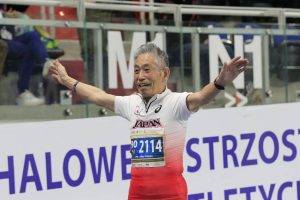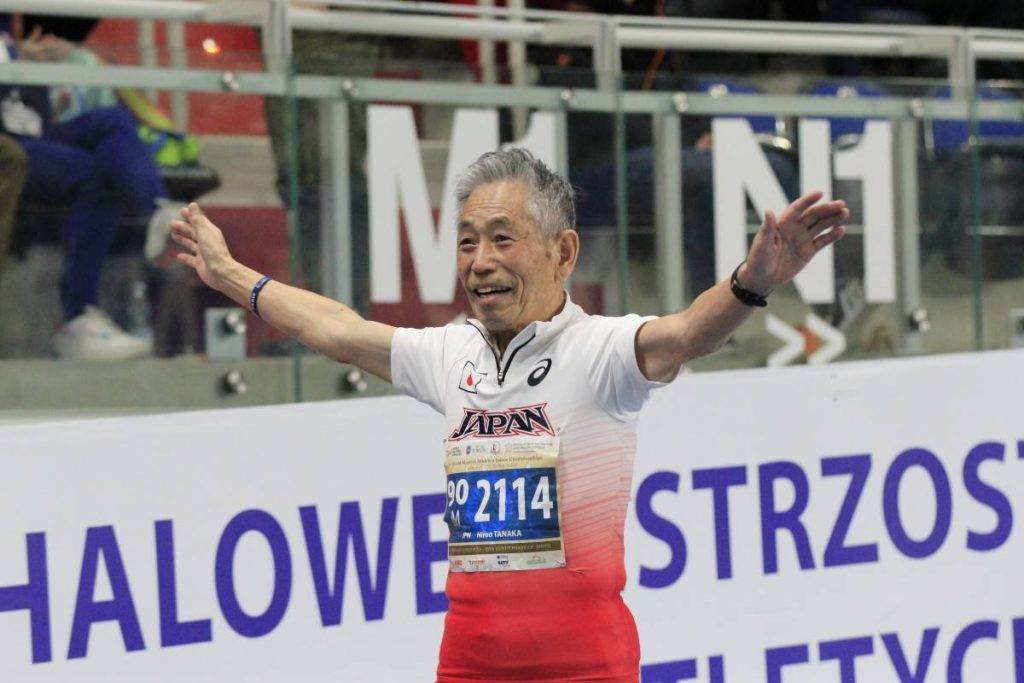Hiroo Tanaka, a 92 years old Japanese retired teacher recently smashed the M90 (male athletes over the age of 90) world 200m record with an incredible 38.79 seconds in Torun in April 2023.
In the same match, Mr Tanaka also finished 60 metres in 10.95 seconds, proclaimed champion in the World Masters of Athletics in the category for people over 90.

While we admire Mr Tanaka and his competitors’ excellent physical health and incredible athletic spirits, we might be wondering: how many such healthy elderly do we know around us? Yes, maybe some, but not too many. So, what are the common physical conditions faced elderly in Asia?
Essentially, elderlies across the globe face similar issues. Some countries in Asia might have worse air quality than others, which pushes up the prevalence of chronic respiratory conditions such as Chronic obstructive pulmonary disease (COPD) and/or lung cancer compared to people in the West. Otherwise, here’s a list of common conditions faced by the elderly:
- Cardiovascular diseases: Heart diseases (heart attack, angina, and arrhythmia), hypertension (high blood pressure), and stroke are significant health concerns among the elderly in Asia. Factors such as sedentary lifestyles, unhealthy diets, and high smoking contribute to these conditions.
- Diabetes: Type 2 diabetes is a growing health issue in Asia, including among older adults. Unhealthy diets, obesity, and genetic predisposition can contribute to the development of diabetes. Proper management through diet, exercise, and medication is crucial.
- Respiratory diseases: COPD, and pneumonia are prevalent respiratory conditions among the elderly in Asia. Air pollution, smoking, and exposure to indoor pollutants are contributing factors.
- Arthritis: Osteoarthritis and rheumatoid arthritis are common age-related joint conditions in Asia. The prevalence of arthritis increases with age and can significantly impact mobility and quality of life.
- Osteoporosis: The risk of osteoporosis, a condition characterized by weak and brittle bones, due to decreasing amount of calcium in the body, significantly increases with age. In Asia, where the population is ageing rapidly, osteoporosis poses a significant health concern, particularly among postmenopausal women.
- Cancer: The incidence of cancer increases with age, and Asia is no exception. Common types of cancer among the elderly in Asia include lung, liver, stomach, colorectal, and breast cancer. Factors like lifestyle choices, environmental exposures, and genetic predisposition contribute to the risk.
- Cognitive decline and dementia: As the population ages, cognitive decline, and dementia, including Alzheimer’s disease, are becoming increasingly prevalent in Asia. These conditions can have a significant impact on the individual’s cognitive abilities, memory, and overall functioning.
- Mental health issues: Depression, anxiety, and other mental health conditions can affect the elderly in Asia. Social isolation, loss of loved ones, and changing social dynamics can contribute to mental health challenges.
- Vision and hearing problems: Age-related macular degeneration, cataracts, glaucoma, and hearing loss are common among older adults in Asia. Regular eye and hearing check-ups are essential for early detection and management.
The conditions listed above are not unpreventable. There are so many things the elderly can do to promote a healthy lifestyle:
- Consult with your doctor: Annual blood tests and medical examinations can be a great start, even if you are asymptomatic. Such annual appointments can also keep you on track with your vaccination status, and monitor any potential disease from the start.
- Engage in regular physical activity: Aim for at least 150 minutes of moderate-intensity aerobic activity per week. Activities like brisk walking, swimming, cycling, or dancing are excellent options. If you have mobility issues, consider exercises that can be done seated or in water.
- Strength training: Include strength training exercises to maintain muscle mass and bone density. The elderly tend to lose muscle mass as they grow older. You can use resistance bands, hand weights, or weight machines. Start with light weights and gradually increase as you build strength.
- Balance and flexibility exercises: Include exercises that improve balance and flexibility to reduce the risk of falls. Yoga, tai chi, and simple balance exercises like standing on one leg can be beneficial.
- Stay active throughout the day: Both physical and mental activity are important. Look for opportunities to incorporate physical activity into your daily routine. Take regular short walks, do household chores, or garden to keep moving. And, engage in activities that promote your cognition, such as learning a new instrument, playing chess and reading.
- Prioritize safety: Make sure your exercise environment is safe. Use proper footwear, clear obstacles, and consider having a companion or using assistive devices if needed.
- Listen to your body: Pay attention to any discomfort or pain during exercise. If you experience any unusual symptoms, stop the activity and seek medical advice.
- Stay socially engaged: Participate in group activities or exercise classes designed for seniors. Social interaction can enhance motivation and enjoyment, making it easier to stick with your fitness routine.
- Maintain a balanced diet: A nutritious diet is crucial for overall health. Include a variety of fruits, vegetables, whole grains, lean proteins, and healthy fats in your meals. Stay hydrated by drinking enough water throughout the day.
- Get enough rest: Allow your body sufficient time to recover and rest. Sleep is important for energy levels, muscle recovery, and overall well-being.
It would be amazing if you or your family member, as an over 90 years old, can run 200 meters in under 40 seconds like Mr Tanaka. But remember, different people have different baseline health conditions. Having a chronic health condition or not being able to run as fast doesn’t render your life less healthy or less happy compared to those who don’t have the condition or Mr Tanaka. If you have concerns, book an appointment with your family doctor and work out a health plan together.

